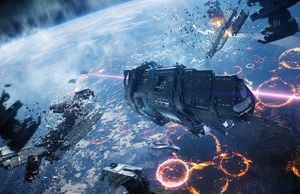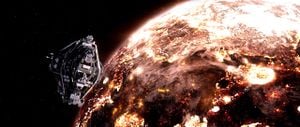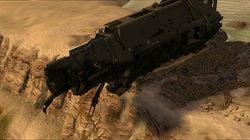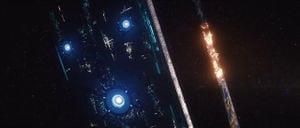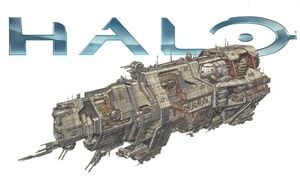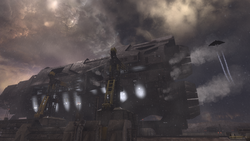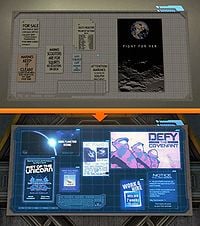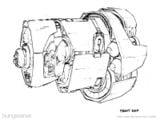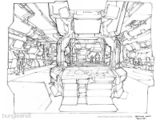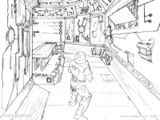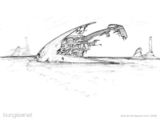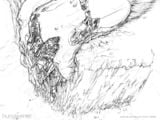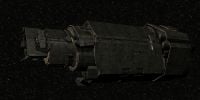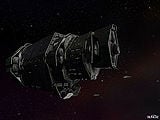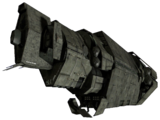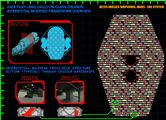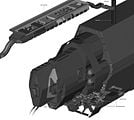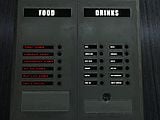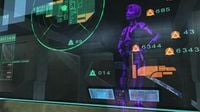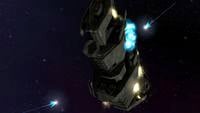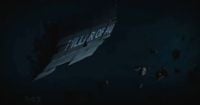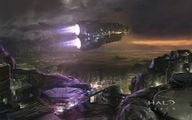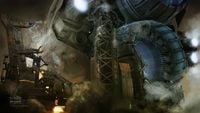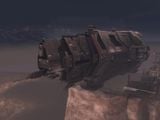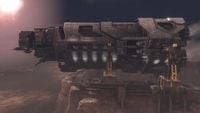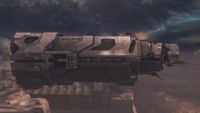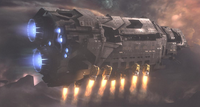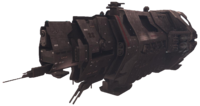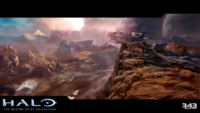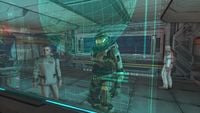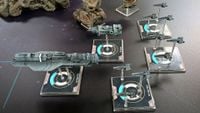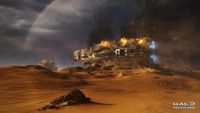UNSC Pillar of Autumn: Difference between revisions
From Halopedia, the Halo wiki
m (→Armament) |
m (→Design details) |
||
| Line 146: | Line 146: | ||
''Pillar of Autumn'' was roughly 43 years old at the time of its escape from Reach and later destruction on Installation 04. It was a cruiser of the ''Halcyon''-class, the lightest cruisers in the UNSC Fleet.<ref name="FoRC25">'''Halo: The Fall of Reach''', Chapter 25</ref> | ''Pillar of Autumn'' was roughly 43 years old at the time of its escape from Reach and later destruction on Installation 04. It was a cruiser of the ''Halcyon''-class, the lightest cruisers in the UNSC Fleet.<ref name="FoRC25">'''Halo: The Fall of Reach''', Chapter 25</ref> | ||
The ''Pillar of Autumn'' was one of only eleven ''Halcyon''-class cruisers to be built with a unique internal frame that was designed by [[Robert McLees (ship designer)|Doctor Robert McLees]]. Incorporating a series of interstitial honeycombs and cross-bracings, it was deemed unnecessarily over-massed and costly due to a series of cross-bracings and interstitial{{Ref/Reuse|FoRC25}} [[Titanium-A armor]] honeycombs.{{Ref/Reuse|FoRC29}} This led to the design being dropped from future models of ''Halcyon''-class ships,{{Ref/Reuse|FoRC25}} and quickly led to most of these ships being removed from service.{{Ref/Reuse|data drop}} However, this unusual framing scheme allowed the ship to function even after sustaining critical levels of damage.{{Ref/Reuse|HCESGuide}} This | The ''Pillar of Autumn'' was one of only eleven ''Halcyon''-class cruisers to be built with a unique internal frame that was designed by [[Robert McLees (ship designer)|Doctor Robert McLees]]. Incorporating a series of interstitial honeycombs and cross-bracings, it was deemed unnecessarily over-massed and costly due to a series of cross-bracings and interstitial{{Ref/Reuse|FoRC25}} [[Titanium-A armor]] honeycombs.{{Ref/Reuse|FoRC29}} This led to the design being dropped from future models of ''Halcyon''-class ships,{{Ref/Reuse|FoRC25}} and quickly led to most of these ships being removed from service.{{Ref/Reuse|data drop}} However, this unusual framing scheme allowed the ship to function even after sustaining critical levels of damage.{{Ref/Reuse|HCESGuide}} This offset its usage of older, heavier armor patterns,{{Ref/Reuse|Enc22}} which provided inferior protection than what was considered standard in 2552.{{Ref/Reuse|FoRC25}} | ||
These protective qualities were improved as part of the ''Autumn''<nowiki>'s</nowiki> refit in 2552. The hull was upgraded to the latest Titanium-A ablative armor plating, which resulted in great savings in terms of volume and mass.{{Ref/Reuse|Enc22}} Hydraulic reinforcements activated during emergencies complemented the existing toughness of its frame.{{Ref/Reuse|FoRC29}} The refit substantially expanded both the [[SOEIV]] launch bays and hangar capacity, with the latter made possible by sacrificing long-term accommodations. It also received an Omega-pattern bridge with a Tier-III datacore.{{Ref/Book|Enc22|Id=Enc22|Chapter=Human Ships, Cruisers|Page=119}} Protruding from its front face is a foremast that is equipped with [[slipspace]] navigation sensors and hardened [[proselytization network]] transponders. A planetary scanning array is mounted just below its bridge, which is outfitted with planetary survey sensors and probe/satellite launchers. Four compact auxiliary fusion rockets are installed on either side of the cruiser, and while they are capable of a high-thrust, they are considered inefficient in their design. At the very top of the engine cowling is a multipurpose scan array, which contains tactical sensors and an electronic eavesdropping suite.{{Ref/Reuse|Warfleet}}. | These protective qualities were improved as part of the ''Autumn''<nowiki>'s</nowiki> refit in 2552. The hull was upgraded to the latest Titanium-A ablative armor plating, which resulted in great savings in terms of volume and mass.{{Ref/Reuse|Enc22}} Hydraulic reinforcements activated during emergencies complemented the existing toughness of its frame.{{Ref/Reuse|FoRC29}} The refit substantially expanded both the [[SOEIV]] launch bays and hangar capacity, with the latter made possible by sacrificing long-term accommodations. It also received an Omega-pattern bridge with a Tier-III datacore.{{Ref/Book|Enc22|Id=Enc22|Chapter=Human Ships, Cruisers|Page=119}} Protruding from its front face is a foremast that is equipped with [[slipspace]] navigation sensors and hardened [[proselytization network]] transponders. A planetary scanning array is mounted just below its bridge, which is outfitted with planetary survey sensors and probe/satellite launchers. Four compact auxiliary fusion rockets are installed on either side of the cruiser, and while they are capable of a high-thrust, they are considered inefficient in their design. At the very top of the engine cowling is a multipurpose scan array, which contains tactical sensors and an electronic eavesdropping suite.{{Ref/Reuse|Warfleet}}. | ||
Revision as of 01:07, May 5, 2024
| UNSC Pillar of Autumn | |||||||||||||||||||||||||||||||
|---|---|---|---|---|---|---|---|---|---|---|---|---|---|---|---|---|---|---|---|---|---|---|---|---|---|---|---|---|---|---|---|
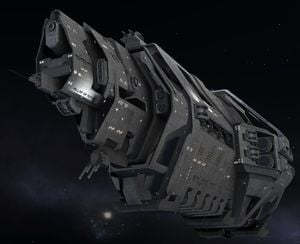
| |||||||||||||||||||||||||||||||
| Ship history | |||||||||||||||||||||||||||||||
| Unified Earth Government | |||||||||||||||||||||||||||||||
|
Name: |
Pillar of Autumn | ||||||||||||||||||||||||||||||
|
Class: |
|||||||||||||||||||||||||||||||
|
Identification: |
C-709[1] | ||||||||||||||||||||||||||||||
|
Operator: |
|||||||||||||||||||||||||||||||
|
Manufacturer: |
|||||||||||||||||||||||||||||||
|
Naval architect: |
|||||||||||||||||||||||||||||||
|
Launched: |
December 1, 2510[2] | ||||||||||||||||||||||||||||||
|
Fate: |
Self-destructed on September 22, 2552 to destroy Alpha Halo | ||||||||||||||||||||||||||||||
|
Captain(s): |
|||||||||||||||||||||||||||||||
|
Artificial intelligence(s): |
|||||||||||||||||||||||||||||||
|
Motto: |
Ad Arcendam Hostium (To Repel the Enemy)[3] | ||||||||||||||||||||||||||||||
| |||||||||||||||||||||||||||||||
- Thel 'Vadamee: "There was only one ship."
- High Prophet of Truth: "One? Are you sure?"
- Thel 'Vadamee: "Yes. They called it the Pillar of Autumn."
- — Conversation between 'Vadamee and the High Prophet of Truth.[10]
UNSC Pillar of Autumn, (hull classification symbol C-709),[11][12] was a Halcyon-class light cruiser in the UNSC Navy. It was informally referred to as the Autumn, and, in some cases, the Pillar.[13][14][15] It was the sister ship of UNSC Dawn Under Heaven[16] and UNSC Toulouse.[17]
Prior to the Fall of Reach Pillar of Autumn was selected to support Operation: RED FLAG, a SPARTAN-II mission to capture Covenant leaders. Captain Jacob Keyes was placed in command. The operation was forestalled by the Covenant assault on Reach; the cruiser carried some of the few UNSC survivors and fled the system having lost most of its intended SPARTAN-II passengers.
The cruiser was guided to the Soell system by the smart AI Cortana. There it was engaged by a Covenant fleet guarding Installation 04. Keyes crash-landed the ship on the installation where the surviving crew continued the battle against the Covenant, and later, the Flood. The ship's sole remaining combat-effective SPARTAN-II, John-117, was forced to destabilize the Autumn's fusion reactor, destroying both the ship and the ringworld, to prevent the Installation from being fired.
Service history
Construction
UNSC Pillar of Autumn was constructed at the Reyes-McLees Shipyards on Mars. The ship began construction in 2507,[3] and was launched on December 1, 2510.[2]
Human-Covenant War
- Main article: Battle for Arcadia
During the Battle for Arcadia in February 2531, Pillar of Autumn engaged two Ket-pattern battlecruisers alongside the UNSC Belfast, UNSC Texas and UNSC Armstrong. Along with the other three ships, Pillar of Autumn destroyed the battlecruiser designated CCS-U321 after catching it with its shields down, but the battlecruiser designated CCS-U624 was able to make it to the surface of Arcadia. In the battle between the UNSC and Covenant forces, Pillar of Autumn was badly damaged along with Armstrong while Texas and Belfast were destroyed. Upon the arrival of the UNSC Spirit of Fire, the smart AI Serina reported on these events to Captain James Cutter.[18] Later in the battle, at the request of Spirit of Fire, Pillar of Autumn contributed several M145D Rhinos to the ground battle, enabling Spirit of Fire's forces to take down a Covenant energy shield.[19]
The cruiser was decommissioned with the remaining Halcyon-class light cruisers, but was reactivated as the war worsened. Pillar of Autumn was pulled from long-term storage and was refitted in 2550 to serve as an emergency support ship in a conflict near Zeta Doradus.[11][20]
A chariot for Spartans
By 2552, it was obvious to the UNSC that the war could not be ended with conventional military action. A desperate plan, known as Operation: RED FLAG was conceived to end the war by capturing Covenant leaders and forcing the enemy to the negotiating table. A colony world would be sacrificed to the Covenant to allow SPARTAN-II commandos to board and disable a Covenant ship, locate the Covenant homeworld, and abduct the targets. Pillar of Autumn was selected on August 25 by the AI Cortana to disable an enemy ship and deliver the Spartans aboard; the ship was selected for the Halcyon-class's durability, despite its class's usual lack-luster offensive capabilities.[20] Command of the ship was given to Captain Jacob Keyes.
The cruiser received another refit designed by Senior Engineer Adam Crokett[1] for the new mission, including a state-of-the-art fusion power plant and improved weaponry.[20] Furthermore, the command bridge was upgraded with a Tier III datacore to house Cortana and the drop pod bays were significantly expanded.[1] After the refit, Cortana was transferred to handle the shakedown.
Fall of Reach
- Main article: Fall of Reach
Pillar of Autumn was prepared to deploy on August 30. However, before it could depart the Epsilon Eridani system it was recalled to Reach; the UNSC fleet was mustering in preparation for an imminent Covenant attack on the planet. However, Cortana remained in control as the ship's normally assigned AI was not yet operational. At the opening of the battle, the Pillar of Autumn was engaged by a Ruma-pattern light carrier and quickly destroyed it with its modified MAC gun.
It was hoped an opportunity to capture an enemy ship would present itself, however, the course of the battle forced the Spartans to deploy on other missions. Blue Team went to Reach's Gamma Station to enforce the Cole Protocol, while Red Team went planetside to reinforce the orbital defense generators. While the cruiser performed well, the battle was lost as the orbital defense platforms fell silent. There was only time to recover the remnants of Blue Team (John-117 and the clinically dead Linda-058) and a Marine fireteam led by Avery Johnson that was also onboard Gamma Station, before the ship was forced to flee the system.
During the battle over Reach, the Pillar of Autumn attacked and destroyed a Covenant "sniper ship" in single combat. This prototype vessel was responsible for the destruction of many powerful UNSC warships. The unlikely victory of the Pillar of Autumn, for a brief moment, left her as one of the most successful and resilient ships in the Navy. However, the ship was heavily damaged in the fight and its main reactor was rendered inoperable.
- Main article: Battle of Asźod
At some point during the conflict, the Pillar of Autumn executed a Class-L flash-dock, landing at the Asźod ship breaking yards to rescue any survivors on the planet and retrieve a package which the remnants of NOBLE Team were tasked with delivering.[21] During the battle, as NOBLE Team approached, the Pillar of Autumn used its point-defense guns to help clear the skies and sent forces into the drydocks to hold them. When Noble Six and Emile-A239 arrived, Emile manned an Onager mass driver set up by the UNSC forces to hold off the Covenant air support. After the UNSC forces took out Covenant attackers on a landing platform, Keyes personally led a Pelican to get the package. However, Emile was killed by a Sangheili Zealot and a Ket-pattern battlecruiser arrived to prevent the Pillar of Autumn from escaping. Using the mass driver, Noble Six destroyed the battlecruiser and the Pillar of Autumn was able to escape into space using R7 thrust couplings.[22]
The Pillar of Autumn was supposed to have made a random Slipspace jump in accordance with the Cole Protocol. However, Cortana surreptitiously guided the ship to the Soell system and, ultimately, to Installation 04 instead. The AI used coordinates obtained from two Forerunner artifacts: one on Sigma Octanus IV,[23] and one underneath Reach. The Covenant pursued along the cruiser's exit vector and arrived at Soell first with a battle group of Ket-pattern battlecruisers.
Battle of Installation 04
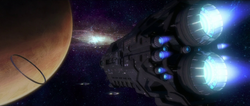
- Main article: Battle of Installation 04
Pillar of Autumn was almost immediately engaged upon arriving at Threshold. The Prophet of Stewardship, who feared stray plasma torpedo fire might damage the holy artifact, ordered the boarding and capture of the cruiser. Fleet Master Thel 'Vadamee ignored this order and returned fire aggressively. Even so, the Autumn was able to destroy four ships and damage Truth and Reconciliation before boarders disabled its Magnetic Accelerator Cannon with an antimatter charge.
Captain Keyes ordered the crew to abandon ship. John-117 was given Cortana for safekeeping, and ordered to keep the AI out of enemy hands. The crew left the ship for the ring in whatever craft were available and the cryo pods were jettisoned. Keyes directed Pillar of Autumn on a course to crash land on the ring. The Covenant finally began hitting the ship with plasma torpedoes, but the cruiser survived the landing reasonably intact, though damaged beyond repair. The Covenant soon swarmed the ship and installed a security detail of two Banshees and six Ghosts to patrol the ship, though a massive raid led by Lieutenant Melissa McKay unseated the Covenant from the ship temporarily, allowing the survivors to transfer supplies from the ship to Alpha Base.[24]
The release of the Flood added an unexpected dimension to the battle. Monitor 343 Guilty Spark was preparing to fire the Installation in response to the outbreak; in conjunction with the entire Halo Array this would wipe out all sentient life in the galaxy. John-117 and Cortana returned to Pillar of Autumn to destroy the ring by detonating the still-functioning fusion reactors. An attempt to activate the cruiser's self-destruct from the bridge failed due to 343 Guilty Spark's interference. The Spartan was forced to manually destabilize the reactors with tactical ordnance.
John-117 and Cortana escaped the subsequent detonation and the ring aboard a Longsword fighter still docked in Launch Bay 7. Pillar of Autumn exploded moments after their escape, blowing up a segment of the ring causing the entire Halo to fall apart; ultimately destroying Installation 04. The detonation itself left a huge crater, almost covering the entire width of the Installation itself.
Legacy
The Autumn-class heavy cruiser, which entered service as the replacement for the Marathon-class after the Covenant War, was partially designed after the refitted Pillar of Autumn. Due to the instrumental role the Autumn played in the war, the lead ship of the new class was named UNSC Pillar of Autumn II in honor of the original.[25]
In 2556, a fragment of the ring that escaped destruction called Alpha Shard was discovered. The supernova-like effects of the Autumn's detonation created a new element unique to the shard fatal only to humans. This element was mined by smugglers from Aleria and transformed into a bioweapon used on the Outer Colony of Sedra by terrorists. After the element was traced to Alpha Shard, Private Talitha Macer correctly surmised that the element was created by the explosion created when the Pillar of Autumn was destroyed. After this theory was confirmed, a joint ONI-Sedran Colonial Guard team underwent a mission to Alpha Shard, destroying the deposits of the new element with a HAVOK tactical nuclear weapon at the cost of most of the team.[26]
Design details
Pillar of Autumn was roughly 43 years old at the time of its escape from Reach and later destruction on Installation 04. It was a cruiser of the Halcyon-class, the lightest cruisers in the UNSC Fleet.[20]
The Pillar of Autumn was one of only eleven Halcyon-class cruisers to be built with a unique internal frame that was designed by Doctor Robert McLees. Incorporating a series of interstitial honeycombs and cross-bracings, it was deemed unnecessarily over-massed and costly due to a series of cross-bracings and interstitial[20] Titanium-A armor honeycombs.[5] This led to the design being dropped from future models of Halcyon-class ships,[20] and quickly led to most of these ships being removed from service.[2] However, this unusual framing scheme allowed the ship to function even after sustaining critical levels of damage.[11] This offset its usage of older, heavier armor patterns,[4] which provided inferior protection than what was considered standard in 2552.[20]
These protective qualities were improved as part of the Autumn's refit in 2552. The hull was upgraded to the latest Titanium-A ablative armor plating, which resulted in great savings in terms of volume and mass.[4] Hydraulic reinforcements activated during emergencies complemented the existing toughness of its frame.[5] The refit substantially expanded both the SOEIV launch bays and hangar capacity, with the latter made possible by sacrificing long-term accommodations. It also received an Omega-pattern bridge with a Tier-III datacore.[4] Protruding from its front face is a foremast that is equipped with slipspace navigation sensors and hardened proselytization network transponders. A planetary scanning array is mounted just below its bridge, which is outfitted with planetary survey sensors and probe/satellite launchers. Four compact auxiliary fusion rockets are installed on either side of the cruiser, and while they are capable of a high-thrust, they are considered inefficient in their design. At the very top of the engine cowling is a multipurpose scan array, which contains tactical sensors and an electronic eavesdropping suite.[1].
Power plant
Prior to being refit for the Spartan mission, Pillar of Autumn was equipped with three Mark II Hanley-Messer deuterium fusion engines, which supplied only 10% the power of the standard 2552 UNSC Navy reactor. Pillar of Autumn was refitted with a set of improved nuclear fusion engines that featured two smaller reactors around a larger one, which were capable of boosting the overall power output by 300% for a short time if needed.[5]
Fusion reactors generate extreme heat which must be removed in order for them to remain active without overheating. The Autumn's overhauled reactors were an especially severe case of this. Usually, the excess heat was conducted to a chemical agent which would then vent into space. However, the Autumn's upgraded specifications also included an upgraded cooling system, which featured a "laser-induced optical slurry of ions chilled to near-absolute zero", which was far more efficient than the typical method and removed the reliance on expendable chemical temperature-control substances. In essence, the amount of excess heat removed by the new system increased as the reactors' output did. This self-regulating and self-cooling power plant was critical in combat since it virtually eliminated a commander's concerns about overheating and slagging a ship's engines.[5]
Pillar of Autumn's reactors were able to be overloaded by explosives, either grenades or rockets, destroying the vulnerable vent cores. Once these were destroyed, the reactors began to go critical, resulting in temperatures of over one hundred million degrees and a thermonuclear explosion large enough to tear apart a Halo installation.[27] This explosion was later revealed to be similar in nature to a supernova and resulted in the creation of a new element on a surviving shard of the installation.[26]
Armament
In 2550, the Pillar of Autumn was reactivated in order to support operations near the Zeta Doradus system. As part of this refit, which had also been applied to other Halcyon-class cruisers, it received one MAC and six additional M58 Archer missile pods,[20] bringing its total missile arsenal to 10 pods. Each of these pods carried a total of 24 missiles. For anti-aircraft and anti-missile protection, it retained its existing 40 M910 Rampart point defense guns.[2]
A subsequent refit was given to the Pillar of Autumn to prepare it for its role in Operation: RED FLAG in 2552. As part of this, its arsenal was drastically expanded, resulting in a final armament of:
- One Mark II, Light Coil - 56A2D4/MAC gun[8] that ran two-thirds the length of the cruiser[1] fired lighter projectiles compared to most ship grade MACs, but these rounds worked much like shredder rounds. Each charge was able to fire 3 rounds,[5] thanks to the addition of prototype power capacitors and rapid-cycling MAC coils.[4]
- Thirty-two M58 Archer missile pods.[1]
- Four Shiva-class nuclear missiles, equipped with thirty-megaton HAVOK warheads. One was loaded onto a remote-controlled Longsword interceptor, while the other three were ship-launched.[28]
- Eighteen M910 point defense guns with overlapping fields of fire for point defense against single ships. These benefitted from a new software updated added as part of the refit.[4] Few of the guns were mounted on the bottom-fore section, as transient magnetic bursts from the MAC tended to magnetize the guns.[5] Two of these cannons were later salvaged by the surviving UNSC personnel for Alpha Base.[1]
- Eight Mark 33 Spitfire naval coilgun batteries.[1]
- Six M66 Sentry autocannon turrets.[1]
Engine room
- Main article: Fusion drive
Pillar of Autumn's engine room was a large, three-deck high chamber allowing access to the fusion engine core. Side passages allowed for movement from the bottom deck all the way up to the catwalks on the third. The manifolds into the cores were suspended above the second deck. Controls on the third retracted these manifolds, exposing a vent that led directly into the core. It was using this method to expose the core via the vents that the John-117 ultimately destroyed the ship and Installation 04. This room is the largest room in Pillar of Autumn with the exception of the hangar bay and the "leap of faith" room.
Airlocks
- Airlock 31, 32: Lifeboats destroyed by the Covenant to make way for boarding craft.
- Airlock 51: Lifeboat destroyed as it departed from the airlock.
- Airlock 52, 53, 61, 62, 63: Lifeboats escaped from the vessel.
Units
Marine units
The Pillar of Autumn had a complement of eight hundred Marines and four hundred ODSTs, totaling 1,200 fighting personnel.[1] The ship's Marine complement were divided into the following units;
- 79th Infantry Battalion[29]
- 5th Platoon[30]
- 14th Platoon[30]
- 22nd Tactical[30]
- 2nd squad[31]
- Fire Team Charlie[31]
- Fireteam Zulu
The 67th Marine Regiment, 3rd Battalion led by Colonel Barry Bizzell may have been assigned to the Pillar of Autumn, but the canon status of this unit is dubious.[32][Note 2]
ODST units
The ship's 400 ODSTs were divided under the following units;[Note 3]
- 1st Battalion[Note 4] - Commanded by Major Antonio Silva.
- A Company[33]
- B Company - Commanded by First Lieutenant Melissa McKay[33]
- 1st Platoon - Commanded by Second Lieutenant Oros[34]
- 2nd Platoon - Commanded by Second Lieutenant Dalu (later replaced by Company Master Sergeant Lister during the Raid on the Pillar of Autumn)[31]
- 3rd Platoon - Commanded by First Lieutenant Melissa McKay[31]
- C Company[33]
- D Company[33]
The following ODST units have a currently undefined place within the existing command structure;
- Fireteam Raven[9]
- Combat Team Alpha[30][Note 5]
- Combat Team Baker[30]
- Combat Team Charlie[30]
- Combat Team Echo[30]
- Combat Team Foxtrot[30]
- Combat Team November[30]
- Combat Team Oscar[30]
- Combat Team Romeo[30]
- Combat Team Sierra[30]
- Combat Team Tango[30]
- Combat Team Victor[30]
- Combat Team X-Ray[30]
Naval Pelican dropship pilots were assigned to the Pillar of Autumn from the 23rd Naval Air Squadron.
Crew
Trivia
Production notes
- When designing the ship, Lorraine McLees took inspiration from the MA5B assault rifle and from images of Mobile Suit Gundam. She described the Autumn as being "essentially a big gun with engines".[36]
- Pillar of Autumn was modeled by former Bungie employee Adam Crokett.[37]
Miscellaneous
- In Halo: The Fall of Reach, the description of Pillar of Autumn is considerably different from its Halo: Combat Evolved incarnation. The bridge is described as having a command chair and a curved viewport; in Halo: Combat Evolved, this chair is absent and the window consists of several flat sections. The novel also describes the bridge as being extremely cramped, with only a meter of space between the command chair and the other stations,[38] while in the game, the bridge is clearly more spacious. According to the novel, there is also an elevator leading directly from the engine room to the bridge.[38] In the game, the engineering and the bridge are on the same level, and there are no doors which may belong to an elevator adjoining the bridge. In addition, the engine room is described as being "hexagonal", while in the game,[5] it consists of two vaguely rectangular chambers with the engine core in the middle. The ship is also described as having rotating centrifuges to generate artificial gravity;[5] no rotating sections are present in the game, unless they are located within the hull.
- Pillar of Autumn's was approximately 1.17 km long, a reference to John-117.[39] The ship's length is exaggerated in the final level of Halo: Combat Evolved to a length of three kilometers, likely to add urgency and suspense to the escape sequence.
- In Halo: Combat Evolved, the ship's emblem is the Marathon logo. In Halo: Reach, the ship's emblem is retconned into the Seventh Column logo. In Halo: Combat Evolved Anniversary, the Seventh Column emblem is replaced by a similar-looking gear, since the Seventh Column is an affiliate of Bungie.
- The bulletin board just outside the bridge of the ship contains a number of amusing clips, some throwbacks to Marathon. These can be examined on the first level of Halo: Combat Evolved. The board has a flier for a missing cat called Jonesy. This is a reference to the Alien movies, where the cat's name was Jonesy. The board also has a flier telling Marines to 'Keep it Clean', a quote later used in Halo 3: ODST.
- The re-textured bulletin board in Halo: Combat Evolved Anniversary includes a classic Internet gag image of a "cat found" poster mistaking an opossum for a cat, as well as a poster labelled "Dark Planetoid Rising", featuring the Forerunner planet Requiem as it appeared in the Legendary ending to Halo 3.
- During the brief cutscene in Halo 2 where Pillar of Autumn escapes, it is portrayed by a Marathon-class heavy cruiser, rather than a Halcyon-class light cruiser; this is because the Halcyon was not coded into the game for the sake of saving resources; this error is rectified in Halo 2: Anniversary.
- In its appearance in Halo: Reach, the ship went through many changes, including that the Marathon symbol is replaced by the Seventh Column symbol, and the bridge has been shrunken to a smaller scale.
- Pillar of Autumn is available as a prop for Xbox 360 Avatars.[40]
- Pillar of Autumn plays a role in Halo: Combat Evolved, Halo Reach and Halo Wars. In the first two, the player has to deal with various objectives surrounding the ship and crew. In Halo Wars, Pillar of Autumn contributes to the Battle for Arcadia before the UNSC Spirit of Fire arrives and then provides the player with support during the battle in the form of experimental Rhinos.
- Although total deck count is unknown, there are a minimum of 75 decks on the Pillar of Autumn, as indicated by the Bulletin Board note Cat Found found near the ships bridge.
Gallery
The outline of Halo Combat Evolved's The Maw level.
Pillar of Autumn in an asteroid field near Reach, moments before a Covenant ship exits Slipspace and attacks in Halo Legends: Origins.
Pillar of Autumn taking plasma impacts at the Battle of Installation 04.
The crashed Autumn in the desert of Alpha Halo, seen in the level The Maw.
Pillar of Autumn's ship emblem as seen in Halo: Combat Evolved. In Halo: Reach, the emblem was replaced by the Seventh Column logo.
A piece of wreckage from the Pillar of Autumn floating in Installation 04's debris field in The Mona Lisa.
Concept art of Pillar of Autumn in Halo: Reach.
Concept art of the crashed Pillar of Autumn for Halo: Combat Evolved Anniversary.
Pillar of Autumn's bridge, as seen in Halo: Combat Evolved Anniversary.
A hologram of Pillar of Autumn on the Halo 5: Guardians multiplayer map Truth (level).

|
Browse more images in this article's gallery page. |
List of appearances
|
|
|
Notes
- ^ On page 274 of Halo: The Fall of Reach, it is stated that Pillar of Autumn's refit power plant consists of a single main reactor linked to two secondary ones; this arrangement is referenced again later on when Cortana gives a damage assessment of the ship to Captain Keyes. However, in Halo: Combat Evolved, it is implied that each of the four exhaust manifolds is linked to an individual fusion reactor, each of which is destroyed by John-117 in the final level. This page follows the information given in Halo: The Fall of Reach, as the novel describes the reactor system in more detail.
- ^ Due to this unit only being mentioned in a cut page from Halo: Warfleet, the canon status of this unit is unknown.
- ^ In Chapter 2 of Halo: The Flood, Silva sends B and C companies away for various tasks, commenting that his camp only has half of its strength left at 200 personnel This means each company has roughly 100 personnel. Later statistics given on ODST combat team organisation place ODST company sizes at 60-112 personnel, in keeping with this information.
- ^ The Halo Encyclopedia pages 54-55 clarify that the twelve companies of a given regiment are named phonetically, with the first battalion taking A-D, second battalion taking E-H and so forth. Given Silva's battalion's subordinate companies are named A-D in Chapter 2 of Halo: The Flood, this means they must be in the 1st battalion of the parent regiment.
- ^ Combat teams are an organisational unit found within the ODST ranks. While combat teams in the level Pillar of Autumn are never explicitly stated to be ODSTs, it can be reasonably inferred that these teams are not marine units.
Sources
- ^ a b c d e f g h i j k l m n o p q r s t u v w x y z aa ab ac ad ae af Halo: Warfleet, pg. 25
- ^ a b c d e f g h i j k l Halo Waypoint: Data Drop 5
- ^ a b Halo Mythos, pages 94-95
- ^ a b c d e f Halo Encyclopedia (2022 edition), chapter Human Ships, Cruisers, page 119
- ^ a b c d e f g h i j Halo: The Fall of Reach, Chapter 29
- ^ Halo: The Fall of Reach, Chapter 33
- ^ Halo: Reach, campaign level The Pillar of Autumn
- ^ a b Halo Waypoint: Pillar of Autumn
- ^ a b Halo: Fireteam Raven
- ^ Halo 2, campaign level The Heretic
- ^ a b c Halo: Combat Evolved: Sybex Official Strategies & Secrets, page 60
- ^ Bungie.net: Bungie Weekly Update 01.29.10
- ^ Halo: The Flood, page 13
- ^ Halo: Reach, campaign level The Pillar of Autumn (objective description)
- ^ Halo: First Strike, page 103
- ^ Bungie.net: Jason Jones Interviewed By You (12/18/2001)
- ^ Halo Waypoint: Halo Community Update - Rockin' & Railin'
- ^ Halo Wars, campaign level Arcadia City
- ^ Halo Wars, level Dome of Light
- ^ a b c d e f g h Halo: The Fall of Reach, Chapter 25
- ^ Halo: Reach, campaign level The Package
- ^ Halo: Reach, campaign level The Pillar of Autumn
- ^ Halo: The Fall of Reach, Epilogue, page 336
- ^ Halo: The Flood, chapter six
- ^ Halo 4: The Essential Visual Guide, page 191
- ^ a b Halo: Nightfall
- ^ Halo: Combat Evolved, campaign level The Maw
- ^ Halo: The Fall of Reach, Chapter 29, page 275 ("In response to Captain Keyes' question about the small single ships in the launch bay, Lieutenant Hikowa states, "Yes Sir. One of the Longswords is equipped with a Shiva-class nuclear missile; it can be remote piloted. We also have three HAVOC Warheads on board").
- ^ Halo: The Flood, Adjunct, Entry 47-2396/10763
- ^ a b c d e f g h i j k l m n o Halo: Combat Evolved, campaign level, The Pillar of Autumn
- ^ a b c d Halo: The Flood, Chapter 6
- ^ Halo: Warfleet – An Illustrated Guide to the Spacecraft of Halo - Early revision of the Pillar of Autumn' page (file link)
- ^ a b c d Halo: The Flood, Chapter 2
- ^ Halo: The Flood, Chapter 5
- ^ Halo: The Flood, Chapter 9
- ^ Halo: The Great Journey: The Art of Building Worlds, page 140
- ^ Adam Crockett: Resume
- ^ a b Halo: The Fall of Reach, page 277
- ^ halo.bungie.org: The Pillar of Autumn Conundrum
- ^ Halo: Waypoint: Halo Avatar Collection - January
- ^ Halo Waypoint: Canon Fodder - Taking Orders
